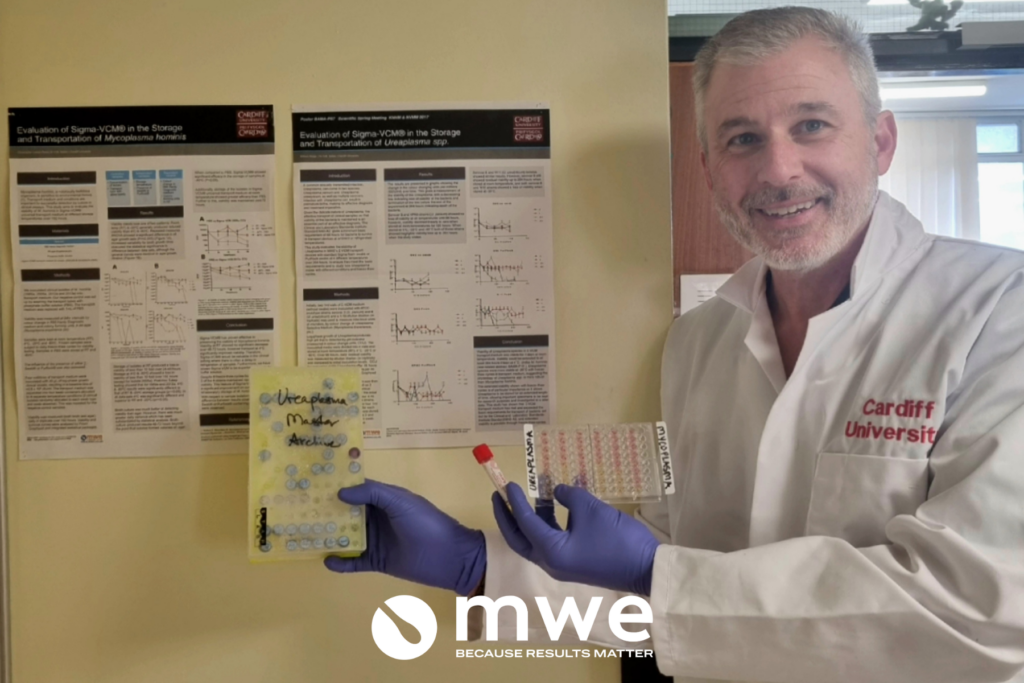SIGMA-VCM™ Surpasses Expectations in Preserving Clinical Samples
We are delighted to share a comprehensive report from Dr. Brad Spiller, an esteemed specialist in the field of microbiology. Dr. Spiller is currently Head of Medical Microbiology Reader in the Division of Infection & Immunity at the School of Medicine, Cardiff University, also holds notable positions at the UK Health Security Agency, and the University of Western Australia. He has provided invaluable insights into the application and benefits of our SIGMA VCM™ product.
In his detailed analysis, Dr. Spiller outlines the challenges faced in the long-term archiving of Ureaplasma spp. and Mycoplasma hominis, two bacterial species that are particularly difficult to culture and maintain. His findings highlight the effectiveness of SIGMA-VCM™ in preserving these microorganisms, thus facilitating ongoing research and clinical diagnostics.
Secure Microbial Archiving with SIGMA-VCM™: Insights from Cardiff University
“My laboratory at Cardiff University School of Medicine was fortunate to be supported by MWE for two final year Medical Pharmacology dissertation projects looking for improvements in the way that we archive clinical Ureaplasma spp. and Mycoplasma hominis isolates.
These bacterial species are notable for their lack of cell wall and cell size of less than half a micron. As my lab also provides the only antimicrobial susceptibility testing service for the UK Health Security Agency for these bacterial species, long term archiving of all tested clinical samples is therefore quite challenging and important.
The two projects assessed the stability of characterised strains of Ureaplasma parvum, Ureaplasma urealyticum and Mycoplasma hominis at room temperature, 4oC, -20oC and -80oC. Testing viability at 24 hr intervals required freeze-thaw for the freezer samples and SIGMA-VCM™ was able to maintain viability after >10 freeze-thaw cycles for both Ureaplasmas and Mycoplasmas with minimal loss. After the project I had started using SIGMA-VCM™ as the primary method for archiving all of my clinical Ureaplasma and Mycoplasma samples given the encouraging results.
This week I returned to the original samples that the students Dr. Chris Rees and William Ridge had archived in the -80oC and found after seven years they still had viable titres of 104-107 bacteria. Because of their difficulty to culture, we assess growth by the change of a yellow to bright red colour generated by their unique metabolism in the 96 well plate shown – and you can see lots of red wells in the 10-fold dilution.
I will next be evaluating if MWE SIGMA-VCM™ can enable shipping of clinical strains between the UK and New Zealand at ambient temperature, as they would both perish quickly in their own solid growth medium (toxic metabolite accumulation even at room temperature) or sterile saline (no cell wall!) to avoid the several thousand pound bill for dry ice shipments between Northern and Southern Hemisphere that would be the alternative.
Many thanks to Douglas Shedden for his continuing support for our research and clinical diagnostic programmes over the years.”
Enhancing Microbiology Research with SIGMA-VCM™’s Reliable Storage Solution
Dr. Spiller’s report underscores the significant advantages of using SIGMA-VCM™ for the long-term archiving of delicate bacterial species. The key benefits highlighted include:
- Long-term Viability: SIGMA-VCM™ was able to maintain viability of Ureaplasma and Mycoplasma species after more than ten freeze-thaw cycles and up to seven years in storage.
- Efficiency in Storage: The product facilitated the stable archiving of these bacteria at various temperatures, proving especially effective at -80°C.
- Potential for Ambient Shipping: Dr. Spiller is now exploring the potential for SIGMA-VCM™ to enable ambient temperature shipping of clinical strains, potentially saving significant costs associated with dry ice shipments.
We extend our sincere thanks to Dr. Spiller for his rigorous research and valuable contributions. His work not only highlights the robustness and reliability of SIGMA-VCM™ but also its critical role in supporting advanced microbiological research and diagnostics.


